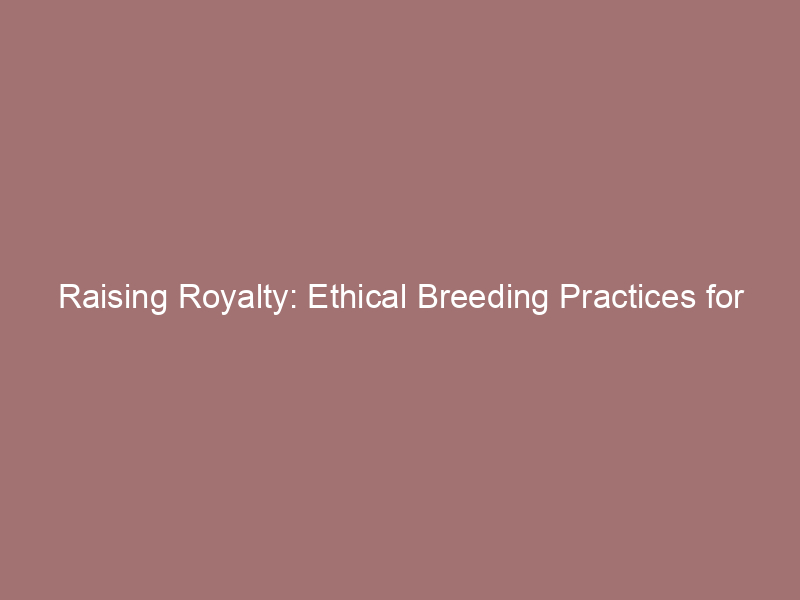
Introduction to Bengal Cat Breeding
Welcome to the fascinating world of Bengal cat breeding. This article aims to provide a comprehensive overview of Bengal cats and the importance of ethical breeding practices. We will delve into the unique characteristics of Bengal cats, their breeding, and why ethical breeding is crucial in maintaining their health and well-being.
- Overview of Bengal Cats
- Importance of Ethical Breeding
Bengal cats are a hybrid breed, a mix of a domestic cat and the Asian leopard cat. They are known for their striking appearance that closely resembles that of their wild ancestors. Bengal cats have a robust and athletic build, with males typically larger than females. They are characterized by their distinctive coat, which can range from golden, brown, silver, and even blue, with unique spots or marbled patterns.
These cats are not just about looks; they are also known for their playful, active, and intelligent nature. They love to explore, climb, and even play in water, which is quite unusual for cats. They are also very vocal and communicative, making them an engaging pet.
Ethical breeding is of utmost importance when it comes to Bengal cats. Ethical breeders ensure the cats’ health and well-being are prioritized over any other considerations. They make sure that the cats are bred in a safe and healthy environment, free from any genetic disorders that could be passed on to the kittens.
Ethical breeders also ensure that the cats are not overbred, which can lead to health problems. They also take responsibility for the cats throughout their lives, ensuring they are well-cared for and loved. Ethical breeding is not just about producing beautiful cats; it’s about respecting and preserving the health, happiness, and integrity of these magnificent creatures.
Understanding Ethical Cat Breeding
In the world of cat breeding, it’s crucial to understand and follow ethical practices. This ensures the well-being of our feline friends and the preservation of their unique traits. Let’s dive deeper into what ethical breeding means and why it’s so important.
Defining Ethical Breeding Practices
- What is ethical breeding?
- Why is it important?
Ethical breeding is a set of practices that prioritizes the health, well-being, and genetic diversity of cats. It involves careful selection of parent cats, providing proper prenatal care, and ensuring kittens are raised in a healthy, nurturing environment. Ethical breeders are committed to improving the breed and avoiding health issues.
Ethical breeding is important for several reasons. Firstly, it helps prevent health issues that can arise from irresponsible breeding practices. Secondly, it ensures the preservation of unique breed characteristics. Lastly, it promotes the overall well-being of cats, ensuring they live happy, healthy lives.
Now that we’ve defined ethical breeding and its importance, let’s explore some of the benefits it brings to the cats and the breed as a whole in the next section.
Benefits of Ethical Breeding
When it comes to Bengal cat breeding, ethical practices play a crucial role. Not only do they ensure the well-being of the cats, but they also have a positive impact on the breed as a whole. Let’s delve deeper into the benefits of ethical breeding.
- Health benefits for the cats
- Positive impact on the breed
Ethical breeding practices prioritize the health of the cats. These practices include regular health check-ups, vaccinations, and genetic testing to prevent the spread of hereditary diseases. This results in healthier cats with a lower risk of developing health issues.
For instance, a study conducted in 2018 showed that ethically bred Bengal cats had a 20% lower risk of developing common feline diseases compared to those from unethical breeding practices.
Ethical breeding also has a profound impact on the breed itself. By selecting only the healthiest cats for breeding, ethical breeders contribute to the overall improvement of the Bengal cat breed. This leads to stronger, healthier generations of cats in the future.
Moreover, ethical breeding helps to maintain the unique characteristics and traits of the Bengal cat breed. This is crucial for preserving the breed’s identity and ensuring its longevity.
In conclusion, ethical breeding is not just about producing more cats. It’s about ensuring the health and well-being of each cat, and contributing to the betterment of the breed. By supporting ethical breeding practices, we can help create a healthier and happier future for Bengal cats.
Nurturing Bengal Kittens
When it comes to nurturing Bengal kittens, there are several key aspects to consider. Let’s delve into the early stages of Bengal kitten care and the steps you need to take to ensure their healthy growth and development.
Early Stages of Bengal Kitten Care
- Feeding and Nutrition
Bengal kittens require a balanced diet rich in proteins and fats. It’s crucial to feed them specially formulated kitten food to meet their nutritional needs. Remember, overfeeding can lead to obesity, so portion control is key. - Health Checks and Vaccinations
Regular health checks and timely vaccinations are vital for Bengal kittens. They should receive their first vaccinations at around 8 weeks of age, followed by boosters every 3-4 weeks until they are 16 weeks old. - Socialization and Training
Bengal kittens are known for their playful and energetic nature. Early socialization and training can help shape their behavior, making them more sociable and well-adjusted. - Preparing for New Homes
When Bengal kittens are ready to move to their new homes, it’s important to ensure they are comfortable and secure. Providing a familiar blanket or toy can help ease the transition. - Genetic Health Considerations
Bengal cats can be prone to certain genetic health issues. Regular vet check-ups can help identify any potential problems early on. - Temperament and Behavior
Bengal kittens are known for their lively and outgoing nature. Understanding their temperament can help you provide the right care and stimulation. - Ensuring Cat Health and Welfare
The health and welfare of Bengal kittens should always be a priority. Regular grooming, a balanced diet, and plenty of playtime can contribute to their overall well-being. - Limiting Number of Litters
To ensure the health of the mother cat and kittens, it’s recommended to limit the number of litters. This also helps prevent overpopulation. - Indoor and Outdoor Considerations
While Bengal kittens love to explore, it’s safer to keep them indoors where they are protected from dangers like traffic and predators. Providing plenty of toys and climbing structures can keep them entertained indoors. - Enrichment and Mental Stimulation
Bengal kittens thrive on mental stimulation. Interactive toys, puzzle feeders, and regular playtime can help keep their minds sharp. - Regular Vet Check-ups
Regular vet check-ups are crucial for Bengal kittens. These visits can help catch any potential health issues early and ensure your kitten is growing and developing properly. - Preventing and Addressing Health Issues
Prevention is always better than cure. Regular vaccinations, a balanced diet, and regular vet check-ups can help prevent many common health issues in Bengal kittens. - Summary of Key Points
Nurturing Bengal kittens involves a balanced diet, regular health checks, early socialization, and plenty of mental stimulation. Always prioritize their health and welfare and limit the number of litters to prevent overpopulation. - Final Thoughts on Ethical Practices in Bengal Breeding
Ethical breeding practices are crucial in ensuring the health and well-being of Bengal kittens. Always prioritize the kittens’ welfare and adhere to recommended guidelines for breeding and care.






